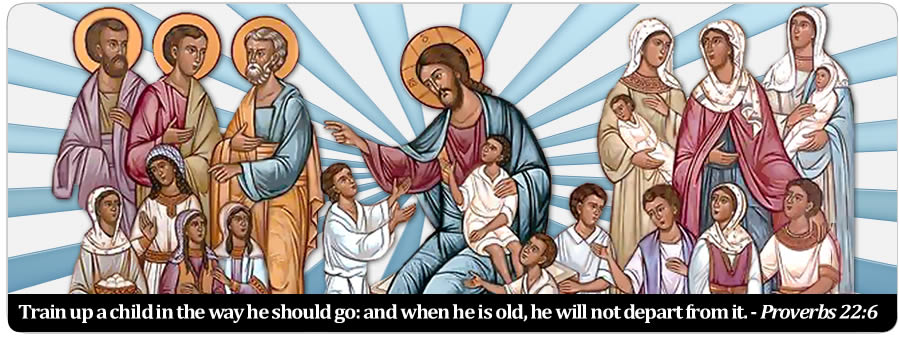|
|||
|---|---|---|---|
| This weekly bulletin insert complements the curriculum published by the Department of Christian Education of the Orthodox Church in America. This and many other Christian Education resources are available at http://dce.oca.org. | |||

The Church honors the Holy Apostle and Evangelist Luke. In his Gospel we read that as people bring their little ones to Jesus so that He may touch them, the disciples "sternly" order the people to stop. But Jesus says, "Let the little children come to me, and do not hinder them, for it is to such as these that the Kingdom of God belongs." Then He adds words that make us stop and think: "Truly I tell you, whoever does not receive the Kingdom of God as a little child will never enter it" (Luke 18: 15-17). How do we become those "little children" to whom the Kingdom is promised? As Joachim Jeremias writes in his "New Testament Theology", the Gospel tells us that it means taking some new attitudes toward things that were well-known in Jesus' time. First, Jesus models a way of praying that isn't restricted to the communal liturgical prayer offered at three prescribed times of day. Jesus prays alone, sometimes through a whole night, as in Luke 6: 12. In addition, the prayer He teaches His disciples, known to us as the Lord's Prayer, is an Aramaic prayer, not a Hebrew one. Aramaic is His mother tongue. Throughout the Gospels, Jesus Christ continues to respect and take part in the thrice-daily liturgical prayer, in Hebrew, known to all pious Jews. But here He is giving to those who want to become "little children" the example of something else: offering personal prayer at any time of day, in their own language. In this same prayer, Jesus instructs the disciples to address God as Abba, or Father. This is a new and huge privilege. Saint Paul emphasizes the point in Romans 8:15-16: "When we cry, 'Abba! Father!' it is that very Spirit bearing witness with our spirit that we are children of God..." To become "little children" we must accept this privilege and put ourselves in God's hands, trusting Him as our loving Father. When we do so, some things will change. For example, in John 9:2 we see the common belief that physical disability is a punishment for sin. When the disciples see a man blind from birth, they ask the Lord who sinned, the man or his parents. Jesus answers by giving a new reason for disability: "that God's works might be revealed in him." And in the Beatitudes, He tells His disciples to rejoice when they are reviled, persecuted and falsely accused. The Father who loves them has authority over everything, so they need no longer fear this kind of evil and injustice. Even the length of our prayers can change. In Matthew 6: 7, the other place in the New Testament where Jesus gives His disciples the Lord's Prayer, He begins by telling them not to "heap up empty phrases" in the belief that they will be "heard because of their many words." Those who are God's "little children" can trust that He knows their needs and hears a short prayer. Luke 12: 32 gives us this assurance: "Fear not, little flock, for it is your Father's good pleasure to give you the Kingdom." |
|||
